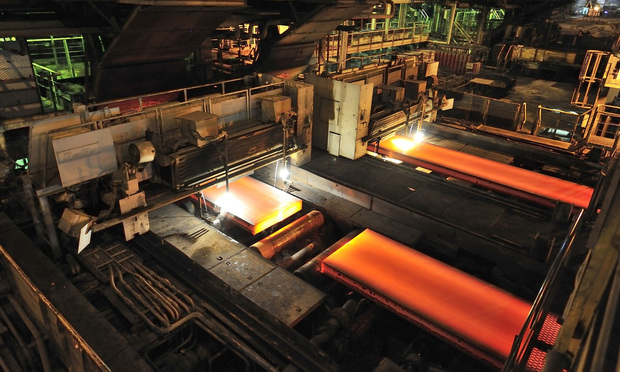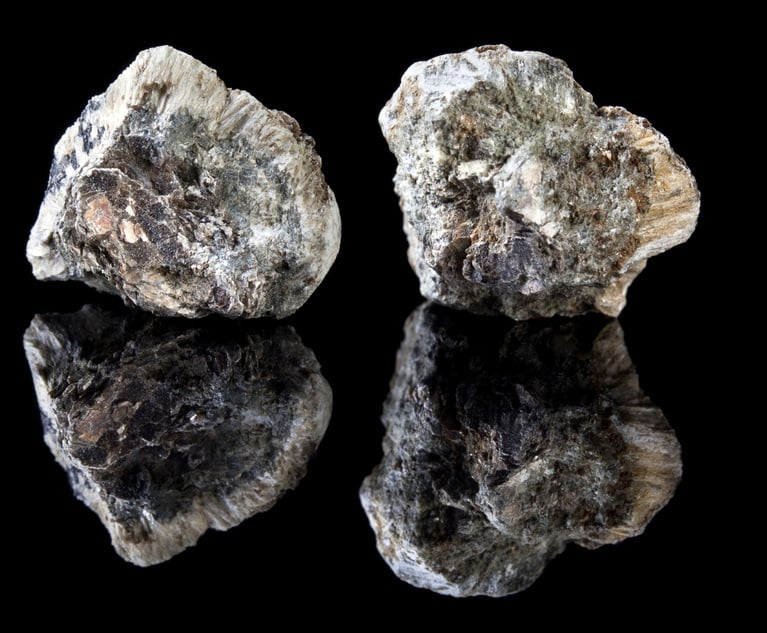International Trade Commission Drops US Steel's Antitrust Claims Against Chinese Steelmakers
United States Steel cannot bring antitrust claims against 40 Chinese steel manufacturers over alleged price-fixing, the U.S. International Trade Commission has ruled in a decision that refines exactly what type of injuries private companies must have suffered to make antitrust claims.
March 22, 2018 at 04:35 PM
4 minute read
 Photo Credit: Shutterstock.com
Photo Credit: Shutterstock.com United States Steel cannot bring antitrust claims against 40 Chinese steel manufacturers over alleged price-fixing, the U.S. International Trade Commission has ruled in a decision that refines exactly what type of injuries private companies must have suffered to make antitrust claims.
As part of its ruling in Certain Carbon and Alloy Steel Products, the commission determined that, in order to bring antitrust claims against other companies, private companies need to show that competition in the market as a whole had suffered, rather than just their business. The ruling, which affirmed a decision by the administrative law judge, adopted federal case law interpreting standing requirements for bringing claims under the Sherman Act.
Claims that the Chinese companies had priced its products below market rates in a way that harmed U.S. Steel's finances fell short of that standard, which requires a showing of “predatory pricing,” the commission said.
“It would be 'inimical to the antitrust laws' to award an exclusion order and/or cease-and-desist order for trade practices where the complainant's losses resulted from behavior that constituted continued competition rather than a reduction in competition,” the commission said. ”U.S. Steel's approach would have the commission create a new version of antitrust law for disputes between private parties that conflicts with established federal precedent and runs the risk of undermining the antitrust laws' fundamental purpose.”
The ruling, which was issued March 19, came nearly three weeks after President Donald Trump imposed a 25 percent tariff on steel products, a decision widely seen as targeting Chinese steel imports.
Commissioner Meredith Broadbent dissented from the ruling, saying she did not agree that private companies needed to show that an “antitrust” injury occurred.
The ruling dismisses a case that faced long odds since it was filed in 2016. U.S. Steel, which is headquartered in Pittsburgh, had sued its Chinese competitors under Section 337 of the Tariff Act of 1930, which is a statute that is more commonly used in patent disputes. If U.S. Steel had been successful, it would have resulted in a ban of all Chinese carbon and alloy steel imports to the United States.
The commission had previously dismissed trade secret misappropriation and false designation of origin claims. On the antitrust claims, U.S. Steel contended that Chinese pricing was unfair, and that the threshold to satisfy standing in federal court is “virtually impossible.” According to the commission, counsel for U.S. Steel said “the reality is that we couldn't” meet the standard even if given the ability to amend its complaint.
The commission, however, said its ruling not only adopted the federal standards, but also aligned with its handling of international property cases brought under Section 337.
Debbie Shon of Quinn Emanuel Urquhart & Sullivan represented U.S. Steel. She declined to comment without talking with her client first.
Covington & Burling attorneys Sturgis Sobin, James O'Connell and Derek Ludwin represented Baosteel America.
O'Connell said he was pleased with the decision, and Ludwin said that, even though Section 337 is not often used to bring antitrust claims before the ITC, U.S. Steel's complaint “reflected a renewed interest” in raising those claims. The attorneys agreed that the opinion provides significant guidance for future litigants.
“When an antitrust claim is brought by a private complainant, that private complainant should have to meet the same requirements they would if they brought that antitrust claim in federal court,” O'Connell said. “Antitrust is antitrust.”
Mark Davis of Greenberg Traurig represented Hebei Iron and Steel. James Altman of Foster, Murphy, Altman & Nickel represented Magang (Group) Holding. Michael Allan of Steptoe & Johnson represented Shougang Corp. Tom Schaumberg of Adduci, Mastriani & Schaumberg represented Anshan Iron and Steel Group. Adam Swain of Alston & Bird represented Jiangsu Shagang Group. Schaumberg declined to comment. All other attorneys did not return a call seeking comment.
This content has been archived. It is available through our partners, LexisNexis® and Bloomberg Law.
To view this content, please continue to their sites.
Not a Lexis Subscriber?
Subscribe Now
Not a Bloomberg Law Subscriber?
Subscribe Now
NOT FOR REPRINT
© 2025 ALM Global, LLC, All Rights Reserved. Request academic re-use from www.copyright.com. All other uses, submit a request to [email protected]. For more information visit Asset & Logo Licensing.
You Might Like
View All
Superior Court Rejects Pa. Hospital's Challenge to $7.3M Med Mal Judgment
3 minute read
Pittsburgh Judge Rules Loan Company's Online Arbitration Agreement Unenforceable
3 minute read
Pa. High Court to Weigh Parent Company's Liability for Dissolved Subsidiary's Conduct
3 minute read
Trending Stories
- 1Litigation Trends to Watch From Law.com Radar: Suits Strike at DEI Policies, 'Meme Coins' and Infractions in Cannabis Labeling
- 2Judge Gets Public Reprimand for Favoring Cops
- 3Investor Sues in New York to Block $175M Bitcoin Merger
- 4Landlord Must Pay Prevailing Tenants' $21K Attorney Fees in Commercial Lease Dispute, Appellate Court Rules
- 5Compliance with EU AI Act Lags Behind As First Provisions Take Effect
Who Got The Work
J. Brugh Lower of Gibbons has entered an appearance for industrial equipment supplier Devco Corporation in a pending trademark infringement lawsuit. The suit, accusing the defendant of selling knock-off Graco products, was filed Dec. 18 in New Jersey District Court by Rivkin Radler on behalf of Graco Inc. and Graco Minnesota. The case, assigned to U.S. District Judge Zahid N. Quraishi, is 3:24-cv-11294, Graco Inc. et al v. Devco Corporation.
Who Got The Work
Rebecca Maller-Stein and Kent A. Yalowitz of Arnold & Porter Kaye Scholer have entered their appearances for Hanaco Venture Capital and its executives, Lior Prosor and David Frankel, in a pending securities lawsuit. The action, filed on Dec. 24 in New York Southern District Court by Zell, Aron & Co. on behalf of Goldeneye Advisors, accuses the defendants of negligently and fraudulently managing the plaintiff's $1 million investment. The case, assigned to U.S. District Judge Vernon S. Broderick, is 1:24-cv-09918, Goldeneye Advisors, LLC v. Hanaco Venture Capital, Ltd. et al.
Who Got The Work
Attorneys from A&O Shearman has stepped in as defense counsel for Toronto-Dominion Bank and other defendants in a pending securities class action. The suit, filed Dec. 11 in New York Southern District Court by Bleichmar Fonti & Auld, accuses the defendants of concealing the bank's 'pervasive' deficiencies in regards to its compliance with the Bank Secrecy Act and the quality of its anti-money laundering controls. The case, assigned to U.S. District Judge Arun Subramanian, is 1:24-cv-09445, Gonzalez v. The Toronto-Dominion Bank et al.
Who Got The Work
Crown Castle International, a Pennsylvania company providing shared communications infrastructure, has turned to Luke D. Wolf of Gordon Rees Scully Mansukhani to fend off a pending breach-of-contract lawsuit. The court action, filed Nov. 25 in Michigan Eastern District Court by Hooper Hathaway PC on behalf of The Town Residences LLC, accuses Crown Castle of failing to transfer approximately $30,000 in utility payments from T-Mobile in breach of a roof-top lease and assignment agreement. The case, assigned to U.S. District Judge Susan K. Declercq, is 2:24-cv-13131, The Town Residences LLC v. T-Mobile US, Inc. et al.
Who Got The Work
Wilfred P. Coronato and Daniel M. Schwartz of McCarter & English have stepped in as defense counsel to Electrolux Home Products Inc. in a pending product liability lawsuit. The court action, filed Nov. 26 in New York Eastern District Court by Poulos Lopiccolo PC and Nagel Rice LLP on behalf of David Stern, alleges that the defendant's refrigerators’ drawers and shelving repeatedly break and fall apart within months after purchase. The case, assigned to U.S. District Judge Joan M. Azrack, is 2:24-cv-08204, Stern v. Electrolux Home Products, Inc.





